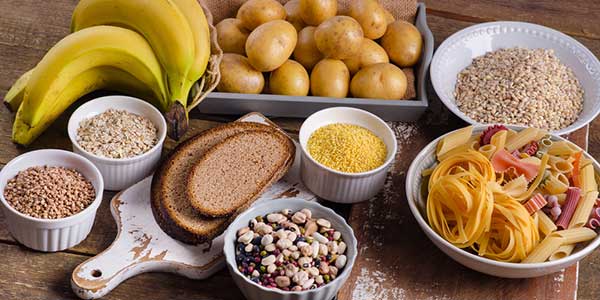
From simple to complex, learn about the different carbohydrates and the sweet (or less than sweet) truth surrounding them!
But First, What Are Carbohydrates?
More casually known as a carb, carbohydrate is one of the three core macronutrients, with protein and fat being the other two. Carbohydrate is the body's primary choice of energy and mostly an umbrella term, as carbs are further broken down relative to their chemical makeup and digestive characteristics, including simple carbs, complex carbs, and fiber.
Simple Carbohydrates
Also known as simple sugars, simple carbohydrates structurally contain one or two sugar molecules and are quickly digested and absorbed in the body. Simple carbs with one sugar molecule are monosaccharides (fructose, glucose, and galactose) while two sugar molecules attached together are known as disaccharides (sucrose, maltose, and lactose). Simple sugars can occur naturally in milk and dairy products, fruits and some veggies, though are predominantly known for their incorporation into products for added sweetness. Mostly including cookies, cakes, and candies, products filled with refined, added sugars generally lack in nutritional value.
Complex Carbohydrates
Complex carbs, also known as starches and polysaccharides, contain three or more sugars and are generally digested and absorbed much more slowly compared to simple carbs. Complex carbs are mostly found in whole foods, including whole grains such as wheat, barley and oats; green, leafy veggies; starchy vegetables such as carrots, potatoes, and pumpkin; beans, lentils, and peas.
Fiber
Unlike simple and complex carbs, fiber is not absorbed by the body, remains mostly intact, and broken down into soluble and insoluble fibers:
• Soluble Fiber
This form of fiber can be thought of as a sponge, showing the ability to absorb with water and create a gel-like byproduct in the digestive tract. Soluble fiber can bind to cholesterol and excrete it from the body, forming the claim "Cholesterol can lower cholesterol," notoriously advertised across a box of Cheerios. Oats, beans, nuts, and apples are additional sources of soluble fiber.
• Insoluble Fiber
In contrast to soluble fiber, insoluble fiber does not bind with water and remains in its whole form. This fibrous plant product is known for its role in digestive health, as it bulks stools and promotes regularity. Sources of insoluble fiber sources include whole grains, nuts and seeds, and the skins of fruits.
The Sweet Truth
Ultimately, individuals are encouraged to consume carbs in the form of whole foods, limiting their intake of highly processed sources such as white breads, pastries, and candies. Additionally, check the ingredient label and avoid or limit products containing white or brown sugar, corn syrup, high-fructose corn syrup, and other sources of added sugar. The American Heart Association recommends men and women limit added sugar consumption to no more than nine teaspoons (36 grams) and six teaspoons (25 grams) daily, respectively.
As a general frame of reference, select naturally-occurring carbs found in whole grains and legumes, fruits and veggies, and milk and dairy products to obtain fiber and other valuable nutrients. And when it comes to the layout of a meal plate, nutrition experts encourage individuals to load up on non-starchy vegetables, complementing them with a lean protein and a healthy fat. Meals can be balanced with a complex carb, such as brown rice or a sweet potato, particularly when accompanying with an appropriate portion size. And if desiring meal assistance, bistroMD delivers nutritionally adequate, flavorful meals straight to your doorstep! Each meal contains 1,100 to 1,400 calories daily with 40 to 50 percent of total caloric intake from lean, adequate protein, 20 to 25 percent of calories from healthy fats, and 30 to 35 percent from complex carbohydrates. For more information on bistroMD and the programs it offers, visit the official page here or call 866-401-3438.







